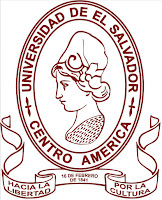Government fails to keep promises to El Salvador's 183 year old public university
February 16 is the 183rd anniversary of the founding of the University of El Salvador. The University, known locally as either "the National" or "UES," is the oldest and only public university in El Salvador. The UES enrolls more than 50,000 students at its central campus in San Salvador, with additional students taking classes at 3 small locations around the country. Today, however, the university is struggling as the government fails to deliver millions in budgeted funding and usurps university facilities for other purposes.
Throughout much of its 183 years the University has had a precarious existence. During the turbulent 1970s and the civil war of the 1980s, the school was shut down for years at a time as the military governments saw students and faculty as left-wing agitators. In 1986, the earthquake which hit San Salvador damaged much of the university infrastructure. Following the civil war, the university gradually got back on its feet, although demonstrations and protests would still occasionally rock the campus as in 2005 and 2010 when protesters seized the university campus for periods of time.
Sadly, university education in El Salvador does not fare well in rankings of universities in Latin America. According to one ranking, the UES ranked 269th among universities in Latin America. Another ranking placed the UES 378th in Latin America. (The UES is either ranked first or second in El Salvador, with the Jesuit-run Central American University José Simeón Cañas as the other top school).
Given that the country's president, Nayib Bukele, talks about making the country a technology and innovation hub, one would expect to see vigorous efforts to improve these rankings with investment towards top-notch higher education to produce a qualified workforce. But several recent events show exactly the opposite.
Most critical for the UES has been the failure of the Bukele government to supply its budgeted funding in the past three years. As the one and only public university in the country, the UES partially depends on budgeted money from the national government to pay its bills. According to the university, the government is in default of paying money due the UES totaling $48 million for the years 2022, 2023 and the start of 2024. As a consequence, the university states that it is in default with suppliers to the tune of $19 million and is at risk of being cut off from water, electricity and the internet, imperiling its ability to function as the country's only public university. According to a report in La Prensa Grafica, the UES has ordered a hiring freeze and cutbacks throughout all its operations, to attempt to deal with the fiscal crisis.
The rector of the University, Juan Rosa Quintanilla has stated that he is seeking out a meeting with the Minister of Education in the government to address the budgetary crisis, but has also stated that the university does not intend to change its practice of offering a free university education to the students who enroll.
The government also pre-empted UES operations during 2023 in order to hold the Central American and Caribbean games. Classes at the central campus of the UES in San Salvador were forced to go online during the entire year so that the government could convert buildings to house and feed athletes, and then delayed in returning the facilities to classroom use. At the end of the year, the government used the university to house journalists from around the world who were covering the Miss Universe pageant. Even as of today, the rector indicates that not all of the UES central campus has been restored from its use during the Games in June 2023.
The most recent usurpation of the university for non-educational reasons happened this week as Nuevas Ideas was housing individuals involved as "vigilantes" or observers for the election ballot counting going on in San Salvador. Nuevas Ideas held a rally on University grounds for its sympathizers. which the University protested as contrary to its policy of not allowing any partisan political activity on the campus as inconsistent with its role as an educational institution.
When he campaigned for president in 2018, Nayib Bukele made a series of promises regarding the UES to establish it as the "best university in Central America." Those promises have gone unfulfilled. (Nayib Bukele himself dropped out of college without completing a degree). As an editorial from the UCA noted:
After the military dictatorships, civilian governments inherited a practice that has been continued intact to the present: access to free higher education of high academic quality is not a priority. It is not due to lack of awareness of the great benefits of investing in science or higher education. It is due to a lack of political will, based on myopic electoral calculations and not on a long-term plan for the country.

Comments